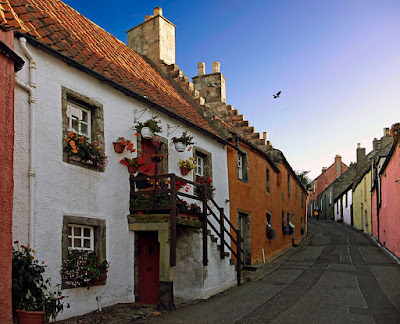Let me start 2012 wishing you all a happy new year, filled with health and joy! After that how about something a little different from the usual travel related posts? Abhishek decided to share with us a bit of Scotland history, more precisely the story Lord Cochrane, a Scotland Naval Hero - not forgetting of course a suggestion on places to stay near Lord Cochrane's city, Culross :)
It is a little known fact that Scotland produced one of the great naval heroes of the nineteenth century. Lord Cochrane achieved hero status in a remarkable career that encompassed daring do’s for the Royal Navy, crusading on behalf of the under privileged as an MP then leading the nascent Chilean Navy in rebelling against the Spanish.
Cochrane’s early life contained much of the of the toughness that so often breeds radical genius. Born at the Dundonald at Annsfield near Hamilton in South Lanarkshire he then spent much of his early life at the family seat of Culross Fife. His father was a frustrated scientific inventor who through the necessity of limited finances having inherited the ancestral pile turned to inventing, partly as an escape partly as a hope making a fortune. His invention of coal tar was later used to seal the hulls of ships but symptomatic of the family relationship with the Royal Navy, they refused to use it until after the patent had lapsed.
Short of cash the young heir was sent to the sea. Here he found a calling and a skill. Unlike most young midshipmen Cochrane was taught of the life of the real Royal Navy through his early mentor Lieutenant Larmour. This gave him both an essential insight into the mind of the British sailor but also invaluable ability as a seaman. It was this grounding allied with a cunning rebellious streak that were to serve him so well through a glittering career.
It is when you read of his exploits as a captain that realise just how remarkable a figure he was. In fact read the works by CS Forester and Patrick O’Brian and is clear both Horatio Hornblower and Jack Aubrey borrowed a great deal from Cochrane’s life. Cochrane’s appeal was his ability to achieve the apparently impossible. In fact very often – such as when he took the major Spanish base of Valdivia in Chile with its surrounding forts. It seemed such an impregnable fortress any attempt to take it was so unlikely to succeed by the time the Spanish knew what was happening Cochrane had already succeeded.
It was this ability to achieve the impossible that meant the Napoleonic French called Cochrane the wolf of the sea. He was never content with simple ship to ship action. Very often he looked to use land action and explosives to achieve his objectives. This could have seen him re-write the book on naval and coastal warfare but Cochrane’s dislike of tory high minded authority meant frequent clashes with the admiralty. This was added to by his years as much loved MP for Westminster where he regularly clashed with the administration. All this added to the Admiralty’s antipathy to Cochrane’s that eventually led to dismissal from the navy and his career abroad as an adventuring, if principled, admiral for hire.
In later life and with a change of administration at home led to his reinstatement and he died as Admiral of the Red; one of the most remarkable military characters of the 19th century.
Mackays Self catering has a two bedroom Scottish cottages in Culross where Cochrane spent his early life.
Home » Scotland » Lord Cochrane, Scotland
Monday, January 2, 2012
Lord Cochrane, Scotland
Another Articles » Guest Posts, Scotland
Subscribe to:
Post Comments (Atom)








0 comments:
Post a Comment